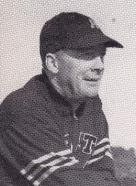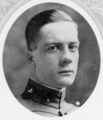Earl Blaik facts for kids
 |
|
| Biographical details | |
|---|---|
| Born | February 15, 1897 Detroit, Michigan, U.S. |
| Died | May 6, 1989 (aged 92) Colorado Springs, Colorado, U.S. |
| Playing career | |
| 1915–1917 | Miami (OH) |
| 1918–1919 | Army |
| Position(s) | End |
| Coaching career (HC unless noted) | |
| 1924–1925 | Miami (OH) (assistant) |
| 1926 | Wisconsin (assistant) |
| 1927–1933 | Army (assistant) |
| 1934–1940 | Dartmouth |
| 1941–1958 | Army |
| Administrative career (AD unless noted) | |
| 1948–1959 | Army |
| Head coaching record | |
| Overall | 166–48–14 |
| Accomplishments and honors | |
| Championships | |
| 3 national (1944–1946) | |
| Awards | |
|
|
| College Football Hall of Fame Inducted in 1964 (profile) |
|
Earl Henry "Red" Blaik (February 15, 1897 – May 6, 1989) was a famous American football player and coach. He also worked as a college sports leader and was an officer in the United States Army. Blaik was the head football coach at Dartmouth College from 1934 to 1940. Later, he coached at the United States Military Academy (Army) from 1941 to 1958. His teams won 166 games, lost 48, and tied 14. His Army football teams won three national championships in a row in 1944, 1945, and 1946. Blaik was honored by being added to the College Football Hall of Fame in 1964.
Contents
Early Life and Playing Football
Earl Blaik was born in Detroit, Michigan. His father, William Blaik, was a blacksmith and made carriages. He had moved from Glasgow, Scotland in 1883. In 1901, Earl's family moved to Dayton, Ohio.
Earl played college football for three years at Miami University in Ohio. Then he played for two years at the United States Military Academy, also known as West Point. While at West Point, he was named a third-team All-American. After graduating in 1920, Blaik served in the United States Cavalry for two years. After his time in the military, he worked in the construction business with his father.
Becoming a Coach
Blaik started his coaching career as a part-time assistant coach at Miami University in 1924 and 1925. In 1926, he worked for a few months as an assistant coach at the University of Wisconsin–Madison.
In 1927, Blaik became a part-time coach at the United States Military Academy. By 1930, he became a full-time assistant coach there.
Coaching at Dartmouth
In 1934, Blaik became the head football coach at Dartmouth College. He coached there for seven seasons. His teams won 45 games, lost 16, and tied 4. His Dartmouth teams had an amazing 22-game unbeaten streak from 1934 to 1937. He coached one player, Bob MacLeod, who later joined the Hall of Fame.
Coaching at Army
In 1941, Blaik was chosen to be the head football coach for the United States Military Academy (Army). Before he arrived, Army had two losing seasons in a row. Blaik asked for some rules to be changed before he took the job. One big change was that football players no longer had strict height and weight limits. This helped Army get bigger players for their team.
At West Point, Blaik coached for 18 seasons. His record there was 121 wins, 32 losses, and 10 ties. Blaik's Army teams had a 32-game unbeaten streak from 1944 to 1947. They won national championships in 1944 and 1945. In 1946, they finished second in the country. Their only "blemish" was a tie game against Notre Dame. In 1946, Blaik was named the AFCA Coach of the Year.
In 1948, Blaik was one of the first college coaches to use a "two-platoon system." This meant some players played only offense, and others played only defense. He was also one of the first coaches to study games play-by-play. He used game films to understand what other teams tended to do.
During his time at West Point, Blaik coached three players who won the Heisman trophy. These were Doc Blanchard (1945), Glenn Davis (1946), and Pete Dawkins (1958). He also coached 11 players who later joined the Hall of Fame. Many of his assistant coaches became head coaches themselves. Some famous ones include Vince Lombardi, who won five NFL titles and the first two Super Bowls.
Under Blaik, the Army football team started to be called the "Black Knights." This nickname now refers to all sports teams at West Point. His players called him "The Colonel" because he was a strict and disciplined coach.
Later Life and Legacy
Earl Blaik stopped coaching Army football on January 13, 1959. He then became a vice president at a company called Avco Corporation.
In 1964, he was inducted into the College Football Hall of Fame. His old school, Miami University, also honored him in their Athletic Hall of Fame in 1969. In 1986, President Ronald Reagan gave Blaik the Presidential Medal of Freedom. This is one of the highest awards a civilian can receive in the U.S.
Blaik passed away in 1989 at the age of 92 in Colorado Springs, Colorado. On September 25, 1999, the football field at West Point's Michie Stadium was named Blaik Field in his honor.
Images for kids
 | Madam C. J. Walker |
 | Janet Emerson Bashen |
 | Annie Turnbo Malone |
 | Maggie L. Walker |




